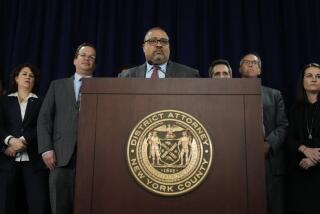GOP Lists 15 Who May Speak on Behalf of Roberts Nomination
- Share via
WASHINGTON — Two members of the U.S. Commission on Civil Rights, a former U.S. attorney general and the mayor of Juneau, Alaska, will be among people expected to speak in favor of Supreme Court nominee John G. Roberts Jr. at the Senate Judiciary Committee hearings next week, officials said Thursday.
Republicans on the Judiciary Committee released a list of people they invited to speak about President Bush’s nominee to succeed retiring Justice Sandra Day O’Connor.
Thirty people are scheduled to testify before the committee after senators finish questioning him -- 15 invited by Republicans and 15 by Democrats.
The Democrats have not released their list.
The Republican roster includes former Atty. Gen. William P. Barr, Juneau Mayor Bruce Botelho, National Collegiate Athletic Assn. lawyer Elsa Cole and U.S. Civil Rights commissioners Jennifer Braceras and Peter Kirsanow.
Barr was at the Justice Department during Roberts’ stint as principal deputy solicitor general, Braceras spoke in Roberts’ favor last week at a news conference in the Capitol, and Cole worked with Roberts when he represented the athletic association in a sex discrimination case in 1999.
Cole said last month: “There was not a question that he had not anticipated.... We got a decision within a month, 9-0 in our favor. Can you do any better than that?”
Botelho is the former Alaska attorney general, and Roberts has represented that state before the Supreme Court.
Also on the list are two representatives of Roberts’ time in the private sector: Catherine Stetson of the law firm Hogan and Hartson, and Maureen Mahoney from the law firm Latham and Watkins.
Democratic Sen. Charles E. Schumer of New York said Thursday that Roberts should answer tough questions posed to him by Democrats, instead of using Justice Ruth Bader Ginsburg as a role model for avoiding issues.
Republicans said Ginsburg declined to answer senators’ questions 55 times at her Judiciary Committee confirmation hearing, and Justice Stephen G. Breyer declined to answer questions 18 times.
The conservative group Progress for America is running a television advertisement that says: “As with Ginsburg, Judge Roberts should not answer questions that force him to prejudge cases.”
But Schumer, a member of the Judiciary Committee, said in a speech Thursday that Ginsburg had a clearer paper trail, given her 13 years as a federal appeals judge, and was a consensus candidate because President Clinton consulted with Republican Sen. Orrin G. Hatch of Utah before nominating her for the court. Roberts became a federal judge in 2003.
“If Judge Roberts repeatedly resorts to the so-called ‘Ginsburg Precedent,’ it will sound less like a principled refusal to answer and more like a variation on the Fifth Amendment: ‘I refuse to answer that question on the ground that it may incriminate me. Answering may reveal my actual views about constitutional law and cause me to lose votes,’ ” Schumer said.
More to Read
Get the L.A. Times Politics newsletter
Deeply reported insights into legislation, politics and policy from Sacramento, Washington and beyond. In your inbox twice per week.
You may occasionally receive promotional content from the Los Angeles Times.










